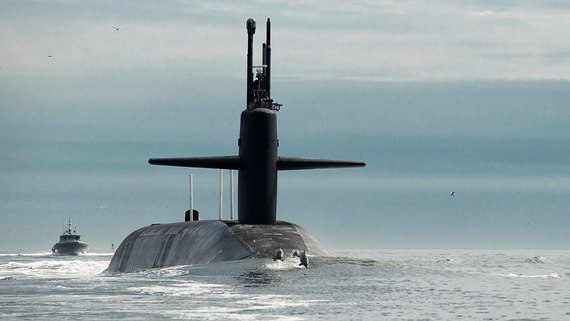The United States refused to give Moscow information about its nuclear forces under the START-3 treaty
[ad_1]

Since June 1, the United States has stopped transmitting information to Russia about the status and location of its strategic weapons, which are subject to the Arms Control Treaty (START, START-3). The US Department of State’s Bureau of Arms Control, Verification, and Compliance cited Moscow’s suspension of participation in the treaty in February 2023 as the reason for this.
As part of retaliatory measures, the United States also decided to revoke the visas already issued to Russian specialists for inspections under the START (and not to issue new ones) and to stop providing Moscow with telemetry on launches of intercontinental ballistic missiles and ballistic missiles of submarines (ICBMs and SLBMs). The United States continues to regard the suspension of Russian participation in the treaty as “legally invalid.”
National Security Adviser to US President Joe Biden Jake Sullivan on June 2 at a meeting of the Arms Control Association in Washington said that the United States is interested in building a new arms control architecture after 2026 (the START expiration date. – Vedomosti), writes Reuters . Sullivan said Washington agreed to negotiate with Russia and China without preconditions on control issues. But, in his opinion, the NWO in Ukraine hinders such negotiations. Sullivan recalled that during the Cold War, the US and the USSR managed to cooperate in the field of arms control, despite the confrontation in other areas and regional conflicts.
Sullivan admitted the possibility of involving France and Great Britain in such work, but so far only in the context of notifications of missile launches. He noted that four out of five countries “have already effectively committed to transparency and restraint in their policies and stances on nuclear weapons” but “more can be done”.
On June 3, Russian Deputy Foreign Minister Sergei Ryabkov said that any US countermeasures would not change Russia’s decision to suspend START, TASS reports. “Our own condition for the return to the full functioning of the treaty is the abandonment of the US fundamentally hostile policy towards Russia,” he explained. Ryabkov said Washington had warned Moscow in advance of the new measures under the treaty. In addition, both countries continue to send notifications of launches of ICBMs and SLBMs under the 1988 treaty.
Sullivan’s speech at a conference in Washington, according to Ryabkov, carries a “destructive charge.” In his opinion, it was an attempt “to present the position of the United States in a more attractive form for the international community.”
Russian President Vladimir Putin announced the suspension of participation in START on February 21, 2023 during his address to the Federal Assembly, and on February 28 he signed the relevant law. Putin’s spokesman Dmitry Peskov explained that Moscow is not leaving the agreement, its goal is to make sure that nuclear parity is observed, taking into account the arsenals of France and Great Britain, which are not included in the perimeter of the agreement. The Ministry of Defense and the Russian Foreign Ministry stated that the Russian Federation would continue to comply with restrictions on the number of carriers of nuclear warheads. Already on March 28, Washington informed Moscow that it was ceasing to provide some of the quantitative data on its nuclear forces.
Russia directly links the issue of strategic arms control to the general situation in Russian-American relations, says Dmitry Stefanovich, a researcher at the IMEMO RAS. Theoretically, if signals are received from the American side (like the recent words of Secretary of State Anthony Blinken that Washington is not pursuing the goal of overthrowing the government or destroying Russia), Moscow’s consent to negotiations on the future of the security architecture can be obtained, the expert believes. According to Stefanovich, Sullivan’s speech has much in common with the Russian approach: in particular, on the topic of connecting the entire “nuclear five”, the connection of nuclear and non-nuclear weapons, etc. Potential space for cooperation can open only if the degradation of relations between Russia and the United States on other tracks stops he concludes.
The Chinese admit that in the future, sooner or later, they will be participants in such negotiations, but at this stage this is impossible for fundamental reasons, says Vasily Kashin, director of the HSE CCEMI. Such negotiations imply a discussion of the composition and dynamics of the development of strategic nuclear forces, and China is now experiencing the most rapid growth in this area of all the countries of the “nuclear five”, the expert said. China’s 14th Five-Year Plan (2021-2025) and Chinese President Xi Jinping’s speech at the 20th CPC Congress stated the goal of building a high-level strategic deterrence system, Kashin notes. This implies reaching a level of development of nuclear and non-nuclear strategic forces that will help China both achieve strategic stability in relations with the United States and ensure their non-interference in conflicts with its participation in the Asia-Pacific zone, the analyst explains.
Negotiations on strategic stability now can only hinder that goal, says Kashin. In his opinion, therefore, the PRC is moving away from Washington’s proposals, referring to the fact that now its forces and capabilities are much more modest than American ones, and therefore, the United States must first disarm to a similar level.
[ad_2]
Source link








